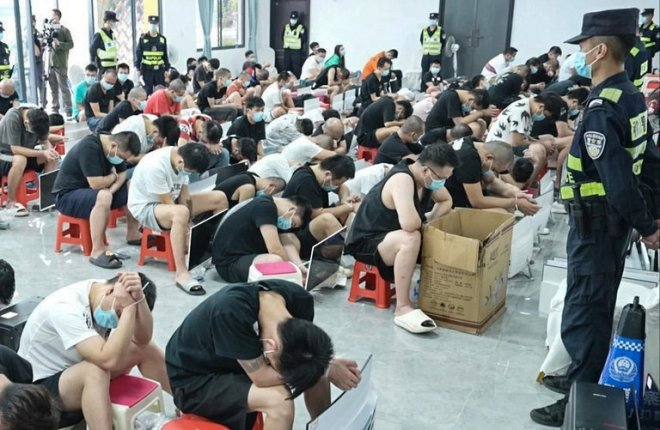Vietnamese workers in Taiwan sacrifice happiness to give families a better life
The 14 Vietnamese migrant workers illegally crossed the border into China, then traveled to Fujian province. There they bought a used fishing boat and embarked on the final leg of their journey: the 160-kilometer (99-mile) voyage across the Taiwan Strait.But the boat never made it. Around mid-March, Taiwanese officials said they had only found 10 bodies washed up in different locations on the island"s west coast.
After a month-long investigation, Taiwanese police determined that after launching from Fujian, their boat had capsized at sea, and the nine men and five women, between the ages of 30 and 42, had all died trying to enter Taiwan so they could earn an income several times higher than what was possible in their homeland.
Many Vietnamese go to Taiwan in search of a better life these days, but if they cannot do it legally, they might take the sea route, said Lee Yangchi, director of the International Criminal Division for Taiwan’s National Police Department.
The police investigation revealed that all of the migrants had previously worked in Taiwan illegally and had been deported for violating labor laws. The law prohibits reentry for several years after being deported.
“Nine people in this group had previously crossed the border into Taiwan to work illegally, while the remaining five had come to Taiwan to work legally but then began working underground,” Lee said. “So they were all deported” – before trying to enter the country again.
Working illegally
According to data released by Taiwan’s National Immigration Service, as of 2019, Vietnamese accounted for 45% of the total number of illegal workers there.
"To tell you the truth, it"s all for making a living," said a Vietnamese working illegally in Taiwan, identified by his initials PNT. The 33-year old from Ha Tinh province in northern Vietnam has been working in Taiwan for eight years, seven of which were illegal.
PNT said he paid U.S.$6,400 to a brokerage company in Vietnam to give him a job in a Taiwan tire factory, but he left the job after finding out his income was lower than expected.
The fees workers pay to brokers can range from U.S.$3,000 to .$7,000, and people are willing to pay.
The average salary in rural Vietnam amounts to a mere U.S.$150 per month according to data from Vietnam’s Ministry of Agriculture and Rural Development. Prospective migrants have to save up years to afford the brokerage fees, or they will go into debt, and carry the burden of paying it off from the moment they arrive in a foreign land.
"The broker said that if you go to Taiwan and work overtime, you can earn more than 20 million dong [$850] a month, but in reality, there are not enough jobs like that," said PNT.
 Farmers pick tea leaves in Tan Cuong village in Vietnam"s northern Thai Nguyen province. Poverty drives many rural workers in Vietnam to leave the country for better-paying jobs. Credit: Reuters file photoAccording to VD Tung, an employee at a Taiwanese labor brokerage company, the problem is insufficient workload for those hoping to work overtime. Workers find that they can only earn the base salary, he said.
Farmers pick tea leaves in Tan Cuong village in Vietnam"s northern Thai Nguyen province. Poverty drives many rural workers in Vietnam to leave the country for better-paying jobs. Credit: Reuters file photoAccording to VD Tung, an employee at a Taiwanese labor brokerage company, the problem is insufficient workload for those hoping to work overtime. Workers find that they can only earn the base salary, he said.Taiwan’s minimum wage is NT$26,400 per month, which is about 20 million dong (U.S.$850), but this has only been in effect since January.
Workers must also pay various fees out of their paycheck, including insurance, brokerage services, and other costs that may arise.
According to Tung, illegal work has a much higher income.
“If you compare the income between legal and illegal work, the legal income never catches up with the illegal income,” he said.
A better life
PNT boasted that with the money he has been able to earn in Taiwan, he built a house for his parents in the countryside and provided education expenses for his five younger siblings.
But working illegally can be a huge risk. Three days after breaching a work contact, the migrant worker will be declared absconded, and the worker’s identity will be provided to the authorities.
If caught working illegally, they will be deported to Vietnam, and banned from returning to Taiwan for six to eight years.
But deportation is not the only fear that illegal workers face. Losing health insurance is another serious problem, especially in the case of illness or work-related accidents.
Because of the lack of proper documentation and the loss of protection from brokers, the workers are exposed to the risk of exploitation and abuse by their employers.
Without proper documentation, illegal workers cannot sign regular employment contracts, so they can only do jobs that pay by the day or by piece, instead of receiving a monthly salary. . And often the work can be harder.
 According to 2019 data released by Taiwan’s National Immigration Service, Vietnamese nationals accounted for 45% of the illegal workers in the country. In this photo, Taiwan immigration officers escort two detained Vietnamese women (2nd L and behind) who had left their tour groups after arriving on tourist visas in 2018. Credit: AFPAlthough he did not disclose his specific workplace, PNT said he is currently working in the high mountains in Taiwan, mostly harvesting vegetables on farms. He said that he has to work 12 hours a day on average.
According to 2019 data released by Taiwan’s National Immigration Service, Vietnamese nationals accounted for 45% of the illegal workers in the country. In this photo, Taiwan immigration officers escort two detained Vietnamese women (2nd L and behind) who had left their tour groups after arriving on tourist visas in 2018. Credit: AFPAlthough he did not disclose his specific workplace, PNT said he is currently working in the high mountains in Taiwan, mostly harvesting vegetables on farms. He said that he has to work 12 hours a day on average.Although he did not disclose his specific workplace, PNT said he is currently working in the high mountains in Taiwan, mostly harvesting vegetables on farms. He said that he has to work 12 hours a day on average.
Asked why he accepted such difficult work, he said, "One must accept a miserable family so that the child can be happy, rather than making the whole family happy.”
After nearly a decade working in a foreign land to support his family, PNT said his wish is to be able to continue working in Taiwan more. Two years from now, his passport will expire. Then he will return to his hometown to build his own future, he said.
The migrant worker population in Taiwan is quite diverse, but most are from Southeast Asian countries such as Indonesia, Vietnam, the Philippines and Thailand.
VD Tung said that the rate of Vietnamese people leaving their legal jobs to work illegally is highest among all nationalities of migrant workers in Taiwan.
Pay to work
“The defection rate of Vietnamese workers is the highest, surpassing that of other countries, because the cost for Vietnamese workers to go to Taiwan is the highest.”
According to Tung, workers from other Southeast Asian countries only have to pay $1,000 or $2,000 to come to Taiwan to work, while Vietnamese have to pay $4,000 to $5,000 or even higher.
The fruits of their labor line the pockets of brokerage firms in Vietnam, but once the workers set foot on the airplane, the Vietnamese brokerage firms’ responsibility immediately ends.
Vietnamese workers in Taiwan told RFA in previous reports that when there was a dispute with their employer, they could not go to any brokerage company for help.
Additionally, Taiwan"s law on protecting the rights of migrant workers is still considered incomplete.
Specifically, migrant workers working in areas such as domestic help and care for the elderly are not covered by the Labor Standards Act, leading to unsafe working conditions, and even abuse.
The Taiwanese government has not yet allowed agricultural employers to hire foreign workers, resulting in a situation where the demand for labor is high but there are few Taiwan citizens looking for farm labor jobs. Employers are therefore forced to hire illegally.
Translated by Hanh Seide. Edited by Eugene Whong and Malcolm Foster.
[圖擷取自網路,如有疑問請私訊]
|
本篇 |
不想錯過? 請追蹤FB專頁! |
| 喜歡這篇嗎?快分享吧! |
相關文章
AsianNewsCast























